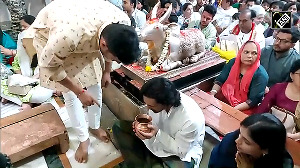India might get one or two new private sector banks very soon. These banks, which will require several hundred employees, could recruit either fresh graduates or poach from rival banks.
 As existing banks also want to ramp up their operations, banking talent is expected to be the most in demand in the near future.
As existing banks also want to ramp up their operations, banking talent is expected to be the most in demand in the near future.
Institutes such as Manipal Global Education Services and TimesPro are catering to the needs of the industry and have tied up with banks to provide talent that is ready for industry roles.
Deepak Lamba, president, Times Centre for Learning, said they had 30 students in every centre. The first batch across campuses has passed out in February this year and 100 students have been placed with an average package of Rs 300,000.
He added banks like Kotak Mahindra Bank, Axis Bank and HDFC Bank have participated in placement drives.
Lamba added a career in private banks was still not a mainstream career option compared to management and other degrees. “The influx of new banks will open up huge employment opportunities for young graduates.
The demand for talent will see a huge upsurge for bank training courses,” he explained.
Manipal Global Education, on the other hand, has seen multiple banks tying up with it for programmes for prospective bank officers. ICICI Bank, Federal Bank and Bank of Baroda have tied up with the institution for setting up schools to train candidates.
For instance, the Post-Graduate Diploma in Banking, offered by Manipal University, has been jointly designed by ICICI Bank and Manipal Global Education for providing professional education to the probationary officers of ICICI Bank.
The programme has been designed keeping in mind the requirements of ICICI Bank to develop skills of their officers in order to enable them to perform proficiently in a banking environment and be effective business managers.
The total programme duration is for a period of 12 months. On completion of the PGDB, the officers will also have an opportunity to pursue appropriate higher degree programmes offered by one of the universities within the Manipal Global Education Framework (MGEF).
Industry sources said there was a surge in demand for candidates in banking, especially after the new bank licence procedure was announced. A senior banker explained that apart from the fear of poaching from newer players, they want to have a ready supply of talent for future management roles.
"There is an anticipation that some senior executives from existing banks may join new banks. To fill up that gap immediately will be a challenge. To deal with this situation, such tie-ups help in getting talent at regular intervals who can be groomed for bigger positions," the executive added.
Apart from these partnerships, there are not-for-profit institutes like Indian Institute of Banking and Finance (IIBF) that provide professional courses to bank employees. Junior Associate of the Indian Institute of Bankers (JAIIB) and Certified Associate of Indian Institute of Bankers (CAIIB) are the flagship courses of the institute. Other than these courses, IIBF offers seven diploma, 12 certificate and two certification and two management courses.
“The response from banks has been overwhelming. We have had multiple private sector banks which have recruited from the campuses with varied profiles being offered. Banks are increasingly looking at industry-ready talent.
The Modern Banker Program of TimesPro is a classic example of the same where we are fulfiling a huge requirement of HDFC Bank for young bankers," said Lamba.
Rather than tying up with only one institute, banks are also looking to partner with multiple institutes for this purpose.
Shyam Srinivasan, MD & CEO of Federal Bank, said they had 400 people undergoing the programme at Federal Manipal School of Banking and the first batch had 120 successful candidates who have been deployed in different roles in the bank.
Srinivasan said they were looking to have more candidates under such initiatives and were exploring partnerships with other institutes as well. Apart from attrition, he explained that such programmes help in filling up the pipeline, especially during retirement of employees.
How the admission process works in bank-led banking programmes at institutes
*Admission notice is invited; eligible candidates are usually those in their last year of graduation
*Minimum and maximum age criteria is specified, not all people can apply
* Each bank has a specific batch size ranging from 200 to 300
* Candidates are selected through a written examination followed by group discussion/interview or both
*The course duration ranges from nine months to 12 months
*The total fee structure could range from Rs 250,000 to Rs 400,000
*All bank-led courses come with job assurance
*After completing the course, a candidate is taken in the assistant manager, junior management grades depending on the bank
*Students can join other banking institutes for management courses in this discipline
*In these programmes, students find jobs either through placement process or through self application





.jpg)






 © 2025
© 2025